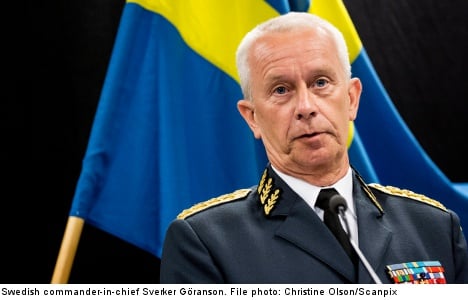Commander-in-chief Sverker Göranson told the TT news agency on Tuesday that Sweden must allow the Armed Forces (Försarsmakten) to invest in quality before quantity. Military researchers recently finished a report looking into Swedish defence in the period 2020 to 2030, using the budget space allocated to the armed forces by parliament in 2009 as a reference.
“In the long term, if they don’t amend our mandate and the resources allocated to us, we will have to disband certain units,” Göranson said. With the current resources available to him, Göranson says Sweden should aim for smaller but more effective units – for example by adapting the fighter jet system to 60 Jas 39 planes.
He also said that if current budget levels were maintained, there would have to be fewer tactical transport aircraft and helicopters in the future, and the navy would face cuts in the number of ships and submarines.
The new report, ordered by the government, concluded that such reforms would entail “a more or less intact readiness capacity but less fighting capacity”. The proposed cutbacks would also result in some money being left over, allowing the Armed Forces to make equipment upgrades in the future.
Such reforms would, however, leave Sweden at a loss if attacked by a foreign power – something Göranson warned of earlier this year and which he says the country’s politicians must take into consideration.
“That is the one question where we have to make up our mind,” said Göranson, adding that his department recommended putting the focus on quality and more in-depth international military cooperation. He at the same time said additional resources would not go amiss.
“We can’t shy away from these decisions. We have given our recommendations now,” he concluded.
Defence Minister Karin Enström said the Armed Forces report would be taken into account when Sweden reviews its defence policies in 2015.
GALLERY: Secret pics of foreign war planes over Sweden
TT/The Local/at



 Please whitelist us to continue reading.
Please whitelist us to continue reading.
Member comments